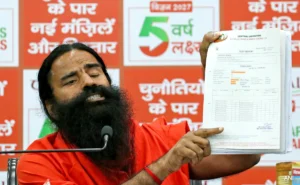On April 2nd, 2024, Baba Ramdev, a prominent figure in both the yoga world and as the co-founder of Patanjali Ayurved, faced summons from the Supreme Court regarding a case involving alleged false advertising and claims. Recent events have thrust him into the spotlight due to legal actions surrounding Patanjali’s controversial advertisements targeting allopathy and asserting curative properties for certain ailments.
In response to a petition by the Indian Medical Association, Justices Hima Kohli and Ahsanuddin Amanullah took a firm stance, summoning both Acharya Balakrishna, the Managing Director of Patanjali Ayurved, and Baba Ramdev for their personal appearance in court. This action came after the Court had previously issued a Contempt notice to Patanjali Ayurved and Acharya Balakrishna for continuing misleading advertisements despite assurances to the contrary.

However, the Court expressed dissatisfaction when it was revealed that Baba Ramdev’s affidavit was not on record. During subsequent sessions, senior advocate Balbir Singh, representing Baba Ramdev, faced admonishment from the Court for the absence of proper affidavits. The Court emphasized the necessity for a definitive resolution, rejecting suggestions of personal apologies without accompanying legal documentation.
The legal situation took another turn as the Supreme Court criticized the Uttarakhand government for its weak response to Baba Ramdev’s actions. Dissatisfied with the response indicating acceptance of an apology and issuing a warning, the Supreme Court demanded an affidavit detailing the actions taken by the Uttarakhand court.
As these legal proceedings unfold, attention remains on Baba Ramdev and Patanjali Ayurved Limited, highlighting the complexities at the intersection of business, healthcare, and regulatory compliance. The outcomes of these legal battles have implications not only for Baba Ramdev and his business empire but also for broader issues of consumer rights and corporate accountability in India.











